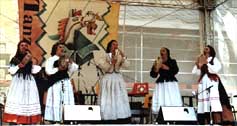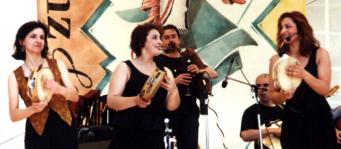 Leilía is the best known band presenting the unique singing traditions of Galicia (northern Spain) to the world.
Leilía is the best known band presenting the unique singing traditions of Galicia (northern Spain) to the world.
 Leilía is the best known band presenting the unique singing traditions of Galicia (northern Spain) to the world.
Leilía is the best known band presenting the unique singing traditions of Galicia (northern Spain) to the world.
Leilía are six young women with powerful strong voices, playing also the pandeireta (hand drum). Even without any other backing, these girls create a very full and impressive sound.
At concerts Leilía have developed an exciting and very effective stage performance, well highlighting their traditions: At the start of the concert the girls are dressed up in traditional Galician costumes to present the pure style of traditional singing - just backed by the pandeireta. After about half of the concert, one of the women leaves stage, while the others sing another song. The sixth girl comes then back onto the stage dressed up in a 'modern' style - she then sings a solo number, while the other girls have time to change their clothing too. And not only the clothing changes in the second half. Together with the costumes, also the way of presenting the traditional songs has changed: now the girls are backed by an (all male) band, with among others gaita (Galicia's bagpipe), guitar, piano, percussion, etc.
 "The most important aim of the group is to present the traditions. The interpretations of the songs are just as we have learned them from old people, we do not change the melodies. To perform these traditions in concerts has always been our goal - since Leilía has started 10 years ago. In the second half with the musical backing, we try to arrange the old traditions, as they are passed on from the old people, in a more appealing way for younger people. The melodies remain the same, it is just that other instruments, more instruments join the singing. The modern clothing is stressing this effect. We are trying to bring the past, the traditions back to nowadays' life. To approach both, to approach the old traditions handed down to us by old folks to a young audiance. That is the idea."
"The most important aim of the group is to present the traditions. The interpretations of the songs are just as we have learned them from old people, we do not change the melodies. To perform these traditions in concerts has always been our goal - since Leilía has started 10 years ago. In the second half with the musical backing, we try to arrange the old traditions, as they are passed on from the old people, in a more appealing way for younger people. The melodies remain the same, it is just that other instruments, more instruments join the singing. The modern clothing is stressing this effect. We are trying to bring the past, the traditions back to nowadays' life. To approach both, to approach the old traditions handed down to us by old folks to a young audiance. That is the idea."
Most of their songs come into Leilía's repertoire through asking older people. "We go into the smaller towns and villages, asking the old people who are in their eighties for their songs. When these people were young, they sang just this kind of songs. And they have learned the songs in those days from their parents, their grandparents, from their families; it is a very old tradition. Often people met to sing together after work. These families have handed down the songs for many decades, centuries. The songs are about love, daily work, marriages - it is an oral form of handing down the tradition."
Traditionally the whole village is singing together. Often, people dance along to the singing. "They are singing and answering each other. After a while they are changing, those who were dancing are now singing and vice versa."
There are seldom solo singers. "Well, sometimes it happens, if somebody is on his way to work, or something like that - but normally the verses are sung in groups. One starts, the others answer, and there is dance to this music. This is just daily life."
 This singing tradition was suppressed by the dictatorship of Franco. At that time all gatherings were forbidden - and a "gathering" was already when three people met. So it became nearly impossible during the Franco time to sing together; "the tradition was stopped completely in those days. Only after the dictatorship, the tradition could be taken up again."
This singing tradition was suppressed by the dictatorship of Franco. At that time all gatherings were forbidden - and a "gathering" was already when three people met. So it became nearly impossible during the Franco time to sing together; "the tradition was stopped completely in those days. Only after the dictatorship, the tradition could be taken up again."
The singing tradition in Galicia is and has always been carried mainly by women. "In the old days, the women in Galicia mostly worked together on the fields, afterwards they met and sang together. And still today the men go out during the day, while the women stay at home and sing. The women are carrying the tradtions still in these days. But there are also enough occasions where the men sing as well, sometimes together with the women, sometimes they have their own verses. But normaly the women sing, and they compose the music, the melodies of the songs, and hand them down."
Last not least the in Galicia much asked question: Are these singing traditions Celtic traditions or not? "There are many roots of the singing traditions in Galicia. There are Celtic roots, but there are also Arabic and Spanish that means Romanic roots. Every village has had other influences, and each has formed their own traditions..."
Leilía have promoted the tradition of Galicia's female singing all over the world for 10 years now. The strong voices of Leilía are always a breathtaking experience.
Photo Credit: All photos by The Mollis. Leilía at Rudolstadt festival 1999
Back to the content of FolkWorld Articles & live reviews
To the content of FolkWorld online magazine Nr. 13
All material published in FolkWorld is © The Author via FolkWorld. Storage for private use is allowed and welcome. Reviews and extracts of up to 200 words may be freely quoted and reproduced, if source and author are acknowledged. For any other reproduction please ask the Editors for permission.
